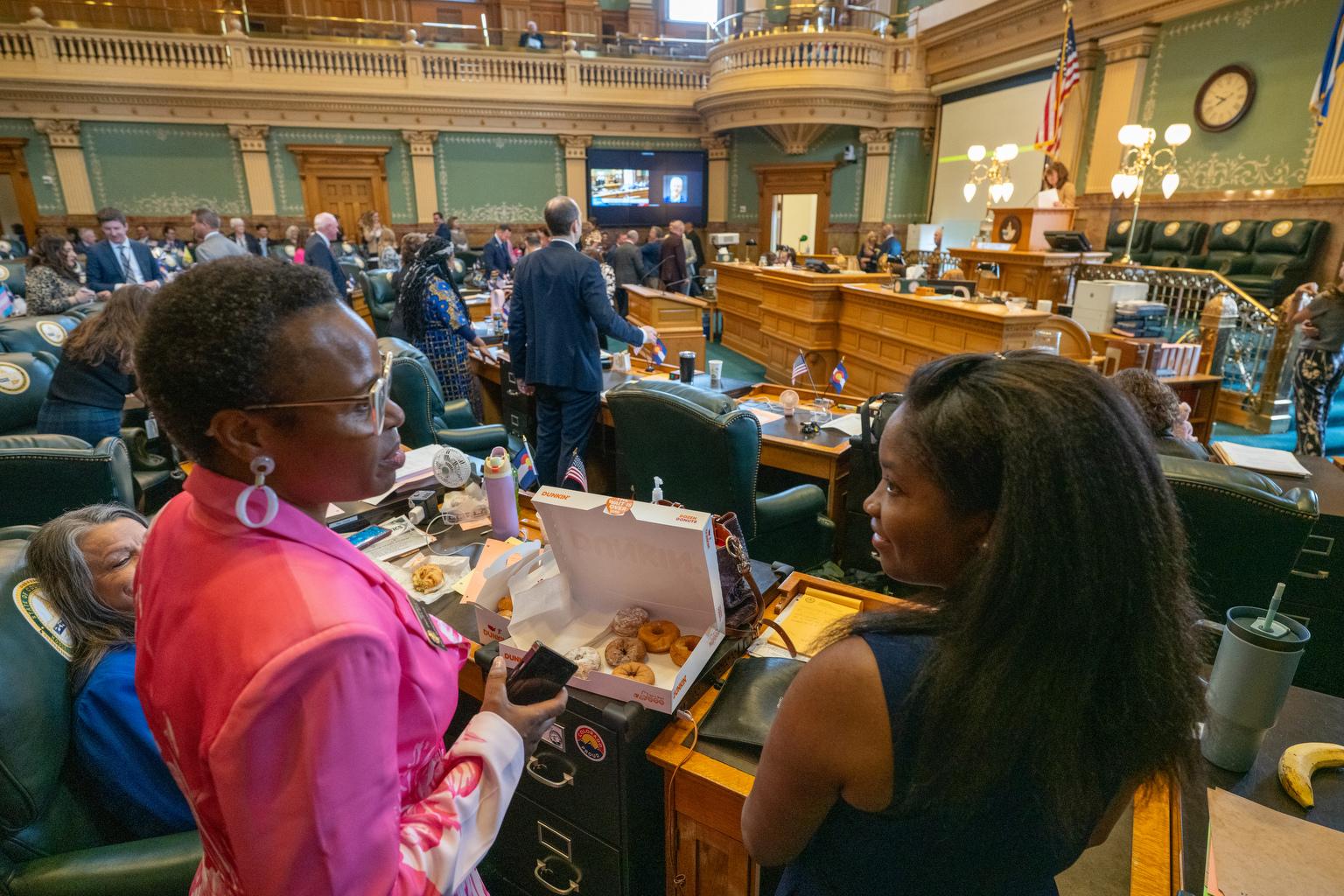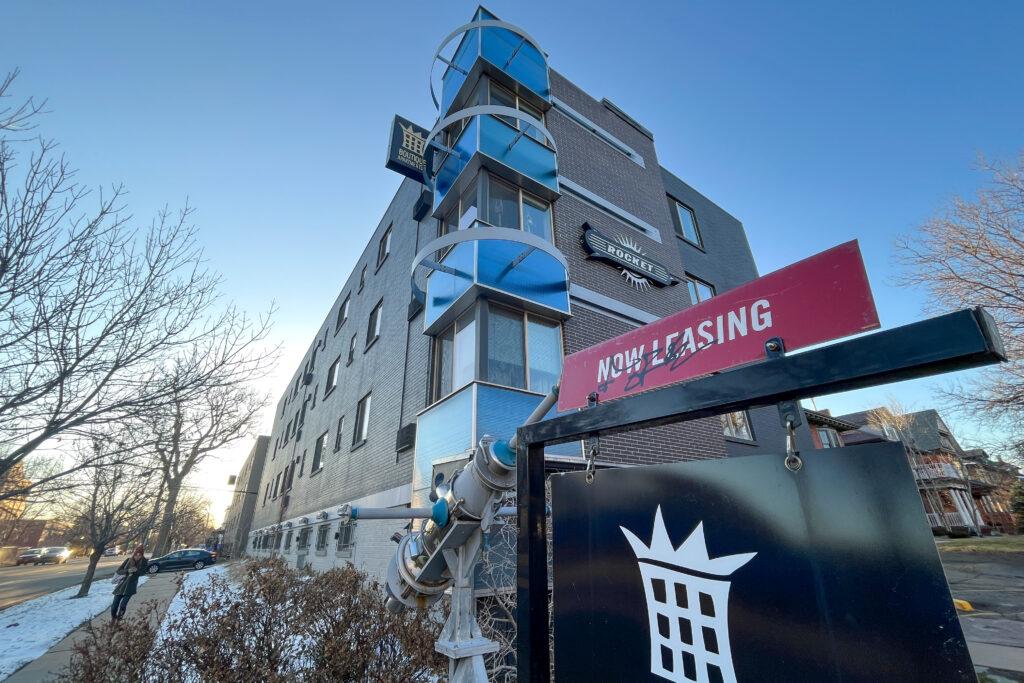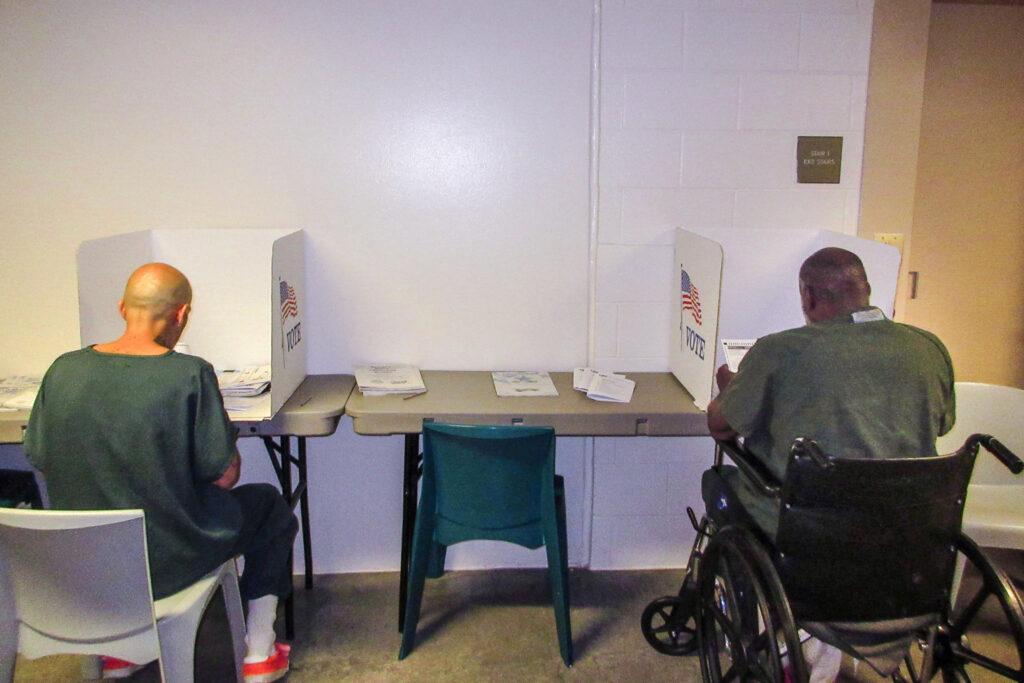
This story was produced as part of the Colorado Capitol News Alliance.
The Colorado legislature debated more than 600 bills at the state Capitol this year during the 120-day term that ended Wednesday.
The Colorado Capitol News Alliance pored through all those measures to highlight the ones that passed — and some that failed — that you most need to know about.
Gov. Jared Polis has a June 6 deadline to sign or veto bills, or let them become law without his signature.
Jump to:
Guns | Business | Housing | Health care | Criminal justice and immigration | Environment | Education | Transportation | Government and taxes | Grab-bag bills
Guns
House Bill 1062: Stealing a firearm in Colorado would be a Class 6 felony, punishable by up to 18 months in prison, under this measure awaiting the governor’s signature. Right now, the penalty for stealing a firearm in Colorado depends on the value of the weapon. Stealing a gun worth less than $300 is a petty offense, punishable by up to 10 days in jail. Gun theft currently becomes a felony, and carries the possibility of prison, only when the weapon stolen is worth more than $2,000.
House Bill 1133: Starting July 1, 2026, the minimum age to buy firearm ammunition in Colorado will be 21 under this measure signed into law by the governor. The legislation also requires that retailers keep ammunition in an enclosed display or behind a counter where customers cannot access them without assistance. >> READ MORE
House Bill 1238: This bill requires a gun show promoter to prepare a security plan and submit that plan to each local law enforcement agency with jurisdiction over the gun show. Polis signed the measure, but included a statement in which he said its provisions apply differently to shows that sell collectible firearms, such as curios, relics or antique firearms.
House Bill 1250: Under this measure awaiting the governor’s signature, starting in the fall, schools would have to provide gun violence prevention materials to parents at the beginning of each academic year and also post them on their website. The Colorado Department of Gun Violence Prevention would generate the materials and be responsible for distributing them to schools.
Senate Bill 3: Starting in August 2026, the manufacture, sale and purchase of certain semiautomatic firearms that can accept detachable ammunition magazines will be outlawed in Colorado under this measure signed into law by Polis in April. Consumers will be able to get around the purchasing prohibition by getting vetted by their county’s sheriff, completing up to a dozen hours of training and passing a test. >> READ MORE

Senate Bill 34: This measure, if signed by the governor, would establish a process to enable a person to voluntarily waive their right to purchase a firearm by adding their name to a “do not sell” list maintained by the Colorado Bureau of Investigation. >> READ MORE
Senate Bill 205: Federal firearms licensees would be able to request a gun serial number check from law enforcement before purchasing a firearm from an individual under this measure awaiting the governor’s signature. The bill would give county sheriff’s offices and police departments 72 hours to complete the serial number check. It would take effect July 1, 2026. The legislation would also require federal firearms licensees to report within 48 hours if they believe someone attempted to sell them a gun that is stolen, lost or involved in an open criminal investigation.
Business
House Bill 1010: This measure, if signed by Polis, would revise the state’s price gouging laws as they pertain to natural or human-made disasters. If the governor declares a disaster emergency, companies would not be able to increase the cost of an item by more than 10% of its price before the disaster began. They also would be prohibited from selling a new item at a significantly higher price than other sellers.
House Bill 1180: Selling a pet or offering one for adoption on the side of the road, in a parking lot or in a public market would be outlawed under this measure if it’s signed by the governor. It would take effect in August. >> READ MORE
House Bill 1208: Local governments in parts of the state where the minimum wage is higher than the state’s base would have the option starting next year of increasing their tipped-wage credit under this measure awaiting the governor’s signature, effectively allowing employers to offer a lower base pay rate. Right now, the credit is $3.02 statewide, no matter what the local minimum wage is. The credit is deducted from the minimum wage to determine how much a restaurant must pay a server. >> READ MORE

Senate Bill 5: This bill would abolish a requirement in the Colorado Labor Peace Act that 75% of workers at a company sign off before unions can negotiate with businesses over union security. Union security is the term for when workers are forced to pay fees for collective bargaining representation — whether or not they are members of their workplace’s union. The measure, which passed in the waning days of the session, is a priority for unions, but Polis has signaled he will veto it. >> READ MORE
Senate Bill 33: The expansion of hard liquor sales in Colorado grocery and big-box stores has been halted under this bill signed into law by the governor. The measure is an effort to protect small businesses that sell alcohol from further economic decline. >> READ MORE
Senate Bill 145: This measure, awaiting the governor’s signature, would require that sellers of goods or services give buyers a chance to cancel an automated subscription before it renews through a one-step process. That process could include a link or an in-person cancellation option, but the cancellation option needs to be accessible, at a minimum, through the same medium by which someone subscribed to the good or service in the first place. If signed, the bill would take effect next year.
Housing
House Bill 1004: In an attempt to crack down on alleged price fixing in the rental market, landlords would be heavily restricted from using software algorithms to set rents, under this measure passed by the General Assembly. It’s not clear, though, whether Polis, who has long been skeptical of such restrictions, will allow it to become law. Colorado is among eight states suing RealPage for encouraging competitors to effectively collude to increase their rent prices, in an alleged violation of federal antitrust laws. RealPage’s rental management software is used by some of the state’s largest landlords. >> READ MORE
House Bill 1030: Starting next year, Colorado local governments that adopt or amend their building codes must ensure that they meet or exceed the accessibility standards set by the International Code Council. This bill has been signed into law.
House Bill 1090: This measure, signed by the governor, requires disclosure of the final cost of goods and services up front, including mandatory fees imposed on consumers. It was geared at landlords to increase transparency in rental costs, but also applies to other businesses, including restaurants and delivery services. It takes effect in 2026. >> READ MORE

House Bill 1093: This new law, signed by Polis in March, expands the state’s prohibition on anti-growth laws in urban areas. Starting July 1, affected local governments will be barred from adopting land use codes that reduce how much residential density is allowed in their community overall. Under the new rules, any reductions to housing density on one piece of land would have to be offset by increases elsewhere.
House Bill 1108: This measure would prevent landlords from imposing early lease-termination penalties or other fees when a tenant dies. It’s awaiting the governor’s signature.
House Bill 1207: Insurers would be prohibited from refusing, canceling or increasing the cost of coverage for residential property owners based on the breed of their dog under this measure awaiting the governor’s signature. It would take effect in August. The measure would also require, starting in 2026, that renters in publicly financed housing be able to have up to two pets.
House Bill 1240: Colorado landlords would have to comply with federal, COVID-era eviction requirements when trying to remove a tenant under this measure awaiting the governor’s signature. The legislation would also require landlords to help tenants gather information needed to apply for rental assistance.
House Bill 1272: Builders who construct condominiums at a certain price point could subject themselves to inspections during the building process in exchange for less liability for construction errors, under this measure awaiting the governor’s signature. >> READ MORE
House Bill 1273: Housing developers would be allowed to build apartment and condo complexes of up to five stories with a single exit, under this measure that Polis is expected to sign into law in an effort to increase housing density in urban areas. The bill requires local governments with populations larger than 100,000 to update their building codes to allow such developments, which tend to have just one staircase and are frequently prohibited by local fire codes. >> READ MORE
Senate Bill 20: The Colorado Attorney General’s Office and Department of Law would be given the power to enforce tenant protection laws and sue landlords over violations of certain state housing laws under this measure, which is headed to the governor’s desk. The measure would similarly empower cities and counties to enforce tenant-landlord laws. That would mark a change from the current legal landscape, in which tenants generally have to fight court battles on their own when they face substandard living conditions or other violations of state housing laws.
Health care
House Bill 1002: With this measure, signed by Polis, lawmakers are trying to make sure health insurance companies cover behavioral health, mental health and substance use disorder treatments as thoroughly as they cover physical health issues. The bill prohibits health insurers from denying care based on a patient’s current or future behavioral health or substance use disorder. The law takes effect next year.
House Bill 1027: This bill, which has been signed into law, updates Colorado's vaccination requirements for children attending public schools. It lessens the state’s reliance on vaccine recommendations from the federal government in response to the Trump administration’s Health and Human Services Secretary Robert F. Kennedy Jr., who prior to his current position was a prominent opponent of vaccine policies. When setting immunization standards, the law directs the state Board of Health to also consider guidance from the American Academy of Pediatrics, the American Academy of Family Physicians, the American College of Obstetricians and Gynecologists and the American College of Physicians. The law has several other public health law updates, including repealing a committee that advises the governor during pandemics.
House Bill 1088: This measure is intended to prevent excessive, surprise charges for ambulance rides. It would limit how much ambulance services can charge for transporting patients and would require health insurance companies to cover the cost, minus deductibles or copays. It would also require ambulance services to post their reimbursement rates online. The governor hasn’t signed the bill yet.
House Bill 1109: Starting next year, death certificates issued in Colorado must report a decedent's gender identity. For transgender people, that can be based on a court order legally changing their name or gender, medical records of their gender transition, or a written statement from the deceased. This bill, signed by the governor, also allows gender on a death certificate to be marked as X, for nonbinary, in addition to male or female. >> READ MORE
House Bill 1259: This measure would ease some of Colorado’s first-in-the-nation disclosure and data retention regulations for sperm banks and donors. If the bill is signed by the governor, sperm banks would not have to remain in such close contact with donors, and sperm banks in other states wouldn’t be subject to as much oversight by Colorado regulators if they send sperm to Colorado. >> READ MORE
Senate Bill 45: The School of Public Health at the University of Colorado would be directed under this measure to analyze implementation of a single-payer health care system — should it raise the estimated $400,000 to pay for the study. The money could come from gifts, grants and/or donations. The measure is awaiting the governor’s signature.
Senate Bill 48: All large-group health insurance plans in Colorado would have to offer consumers a plan that covers Glucagon-like peptide-1 medications, known as GLP-1 drugs, to treat obesity and pre-diabetes. Those include injectable medications like Wegovy and Ozempic. The measure, if signed by the governor, would take effect in 2027.
Senate Bill 71: Pharmaceutical companies would be prohibited from restricting hospitals' use of the federal 340B prescription drug discount program under this measure awaiting the governor’s signature. Also, the bill would require that hospitals report to the state how they are using their savings from the program. Another bill, Senate Bill 124, started out as a rival measure that significantly restricted how hospitals could use their 340B proceeds. After several amendments, the bill would have required nonprofit hospitals to use at least 80% of their 340B revenue for patient services or other things to improve access for low-income patients. The measure, which was rejected on the final day of session, would also have prohibited 340B money from being spent on lobbying and advertising. >> READ MORE
Senate Bill 129: This measure, already signed into law, is meant to shield abortion providers and patients, as well as transgender people and their doctors, from out-of-state investigations. The legislation will let health care providers omit their names from prescriptions they write and clarifies that Colorado governments, hospitals and insurers don’t have to comply with investigations into abortion and transgender care initiated in other states.

Senate Bill 130: This abortion-centered bill would define going into labor and certain pregnancy complications as “emergency medical conditions” and mandate that emergency departments and other medical facilities treat patients with such conditions. It also defines abortion as an emergency medical treatment when the procedure is necessary to stabilize a patient. It would give the attorney general the power to investigate violations and includes protections against retaliation for facilities that follow the rules. It hasn’t been signed by the governor yet.
Senate Bill 144: The state currently covers three months of paid work leave for new parents, with an extra four weeks for parents who experience complications at birth. This measure, if signed into law, would provide families whose babies have to stay in the neonatal intensive care unit with 12 additional weeks of leave.
Senate Bill 183: Medicaid and Child Health Plan Plus recipients in Colorado can get abortions covered by the health care safety net programs, under this bill that was signed into law by the governor. The legislation implements Amendment 79, which voters approved in November, protecting unfettered abortion access in the state constitution. >> READ MORE
Senate Bill 289: This measure, which hasn’t been signed by Polis yet, would create a state-regulated drug donation program to allow pharmacies, long-term care facilities, medical providers and members of the public to donate unexpired prescription medicine for redistribution to poor and uninsured patients.
Criminal justice and immigration
House Bill 1013: Prisoners would have a right to see visitors under this measure. Currently, visitation is a privilege for people in Colorado prisons. The bill awaits the governor’s signature.
House Bill 1031: Law enforcement whistleblowers would get new protections against retaliation under this measure, which is awaiting the governor’s signature. The measure lays out specific forms of prohibited retaliation against officers who report misconduct. It also allows whistleblowers to seek damages if they are retaliated against. A similar bill failed at the Capitol in 2024 largely due to opposition from police and sheriffs.
House Bill 1058: This measure, which was signed into law by the governor, changes the process that’s triggered when someone charged with a crime pleads not guilty by reason of insanity. Those changes include requiring attorneys, state officials and the court to determine how long a sanity evaluation will take.
House Bill 1136: This measure would make changes to the Peace Officers Standards and Training Board in an effort to increase its oversight of law enforcement conduct. If signed, it would give police officers the ability to appeal their inclusion in the POST Board’s conduct database and gives the board the power to remove officers from the database or revoke their certification if it sees fit. The measure would also implement more stringent reporting requirements for law enforcement agencies when submitting information about officers’ conduct to the database, including requiring that they provide more documentation about disciplinary actions taken against officers.
House Bill 1138: Courtroom discussion of a sexual assault victim’s previous sexual activity is no longer allowed in civil cases where the defendant is their former partner under this measure signed into law by the governor. There is an exception for when previous sexual contact between a victim and defendant may be used to explain that the former partner is not the source or origin of semen or any other similar evidence of sexual activity that resulted from a sexual assault. And that evidence could only be discussed in court after it is first reviewed in private by a judge. State law already prohibits other discussion in court of a sexual assault victim’s previous sexual activity. >> READ MORE
House Bill 1275: Crime lab employees would be required to report misconduct by a supervisor or lab director within seven days under this measure awaiting the governor’s signature. The bill would also create a process for prosecutors and defendants in cases affected by crime lab misconduct. The legislation was brought in response to a scandal involving a Colorado Bureau of Investigation crime lab scientist. >> READ MORE

Senate Bill 62: Failing to appear in municipal court on a municipal charge can no longer be a separate crime with separate penalties under this measure signed by the governor. However, municipal judges can still issue a warrant for someone who fails to appear in court and they can be arrested on that warrant.
Senate Bill 276: This bill, a reaction to the Trump administration’s crackdown on illegal immigration, would expand limitations in Colorado on who can share data about immigration status so that it applies to cities and counties, public schools, public health clinics and public day cares. Another provision would require public buildings, including schools, libraries and health care clinics, to develop policies around when immigration agents can access the facilities. It would also make changes to citizenship disclosures when applying for IDs and in-state tuition and add protections for immigrants living in the U.S. unlawfully who have pleaded guilty to low-level crimes. This bill hasn’t been signed by the governor yet. >> READ MORE
Senate Bill 288: With this bill, AI-generated child sexual abuse materials would be included under the state’s existing child pornography laws. The policy, which is awaiting the governor’s signature, also makes it a crime to post realistic, explicit computer-generated images or video of a person without their consent or with the intent of harming them. >> READ MORE
Senate Bill 304: This measure, if signed by the governor, would create the Colorado Sexual Assault Forensic Medical Evidence Review Board. Its members, drawn from the AG’s office, the state’s public safety department, local law enforcement, the medical community and nonprofits that assist victims of sexual assault, would be tasked with developing recommendations for how Colorado addresses sexual crimes. Lawmakers created the board in response to the revelation that the state currently has a year-and-a-half backlog in its testing of sexual assault evidence. >> READ MORE
Senate Bill 310: This bill, which the governor is expected to sign, implements Proposition 130, a $350 million support fund for law enforcement that voters approved in the 2024 election. To pay for it, the state is rerouting money from its reserves in an unusual series of maneuvers. The legislation calls for the state to pay the Colorado Public Employees’ Retirement Association $500 million, which the pension could invest to fund future retiree benefits. PERA, in turn, would forgo $35 million a year in future state payments to the pension; that money would be redirected to pay for the law enforcement grants required by Proposition 130. >> READ MORE
Environment
House Bill 1009: Starting in August, fire protection and metropolitan districts will be able to require the removal of dead or dry material that can fuel a wildfire — like leaves, grass and pine needles — from private property. The legislation, signed into law by the governor, also lets the district impose fines on property owners who don’t comply.
House Bill 1040: Nuclear energy is now considered a clean energy source in Colorado after the governor signed this measure into law. The state also includes geothermal, solar, small hydroelectricity, wind and hydrogen energy as clean energy sources. Adding nuclear onto the list opens up future nuclear projects to special funding opportunities. >> READ MORE
House Bill 1113: Starting in 2028, local governments would be prohibited from allowing nonfunctional turf from being installed as part of a new or redeveloped multifamily residential property under this measure awaiting the governor’s signature. The measure would also require local governments to regulate the installation of nonfunctional turf on other residential properties in a way that reduces water use. >> READ MORE
House Bill 1182: Home insurance companies would be required to take into account wildfire mitigation work done by homeowners and communities when calculating a property’s risk of burning in wildland blaze, if this bill is signed by the governor. Insurers would also have to post on their websites different mitigation work homeowners can do to drive down their premium costs. Finally, insurers would have to disclose information to the state, as well as homeowners, on how they calculate wildfire risk. >> READ MORE

House Bill 1311: Starting in July 2026, this bill, if signed into law, would prohibit sports betting operators from deducting free bets from their proceeds to save money on their taxes. That change would generate a projected $13 million in tax revenue each year, money that would go toward water projects.. >> READ MORE
Senate Bill 299: People and companies selling residential solar-power systems would have to disclose the terms of financing, be truthful about electric bill savings and not make cold-call solicitations between 8 p.m. and 9 a.m., under this measure awaiting the governor’s signature. The bill would also give consumers three days to cancel a contract they’ve signed for residential solar-power systems.
Education
House Bill 1041: Public universities and colleges in Colorado are now allowed to pay student athletes for their name, image and likeness rights under this measure signed by Polis. The measure allows schools to keep the payments private. >> READ MORE
House Bill 1135: Each Colorado school district would have to create a cellphone use policy for students, under this measure awaiting the governor’s signature. The measure, which has been signed by the governor, takes effect in July 2026. >> READ MORE
House Bill 1192: Public high schools in Colorado would have to work financial literacy into their curriculum, under this bill awaiting the governor’s signature. >> READ MORE

House Bill 1274: Colorado lawmakers voted to refer two measures to the ballot to raise money for the state’s universal school meals program. One will ask voters to let the state hold onto $12 million in excess revenue collected under the existing tax for school meals that voters approved in 2022’s Proposition FF. The other would raise $95 million in additional taxes annually from high earners to shore up the Healthy School Meals for All program, which doesn’t have enough money to meet demand. >> READ MORE
House Bill 1320: The state’s annual School Finance Act would increase spending on school operations by $412 per student to a total of $10 billion next year — enough to fully fund inflationary increases required under the state constitution. Due to state budget concerns, the state would provide about 55% of the total, with school district property taxes making up the rest. The measure would also delay the implementation of the state’s new school finance formula, stretching it from a six-year phase-in to seven years. The bill passed on the final day of the session and awaits the governor’s signature. >> READ MORE
Senate Bill 63: School districts and charter school operators will be required to write policies governing how they’ll handle challenges to books in their libraries. The measure also limits who can challenge the presence of a book in a school library collection and says that a book can’t be challenged more than once every two years. The bill was signed by the governor May 1. >> READ MORE
Transportation
House Bill 1281: Coloradans would be allowed to drive Japanese mini vehicles, known as kei trucks, on most of the state’s roads under this bill awaiting the governor’s signature. The measure would generally bar the vehicles from traveling on roads with a speed limit greater than 55 mph. >> READ MORE
House Bill 1290: Starting in August, it would become a Class 1 misdemeanor to assault a transit worker — such as someone operating a bus or train — should the governor sign this bill into law. It also opens up some state law enforcement funding for RTD’s police force.
House Bill 1291: Rideshare companies like Uber and Lyft would be required to enact new safety measures, including rules around removing drivers and responding to law enforcement investigations in a timely manner. If signed into law, it would ban drivers from offering passengers food or drink, and it gives passengers more power to sue if they’re harmed during a ride, instead of going to arbitration. It also would require that passengers and drivers have the ability to opt into audio and video recording of a ride. >> READ MORE

House Bill 1230: Colorado school districts would be allowed to work with local authorities to install cameras on their buses that detect motorists who illegally pass school buses and issue them up to a $300 fine, under this measure awaiting the governor’s signature.
Senate Bill 69: Colorado could begin allowing private companies to offer tire chain services along I-70 under this bill awaiting the governor’s signature. Senate Bill 69 would also require rental car companies to notify their customers of Colorado’s traction laws. It would clarify that all-wheel drive vehicles must have winter or all-season tires to comply with the passenger-vehicle traction law. >> READ MORE
Senate Bill 161: This measure, once signed by the governor, would require the Regional Transportation District to set goals for ridership, safety and expanding service. It also would set up a state commission that would examine RTD’s governance and performance.
Senate Bill 281: This measure would make it a Class 1 misdemeanor to drive carelessly and seriously injure or kill another person. The legislation would also clarify that a charge of careless driving resulting in serious injury or death could be filed for each person hurt or killed in a crash. The bill awaits the governor’s signature. >> READ MORE
Government and taxes
House Bill 1005: This measure, signed into law by the governor, offers tax incentives for the Sundance Film Festival, which is relocating to Boulder starting in 2027. The credit is worth between $3 million and $5 million a year through 2036.
House Bill 1077: This measure, signed by the governor, reverses the legislature’s 2024 decision to limit who is authorized to inspect backflow prevention devices. The bill clarifies that inspection, testing or repair of backflow prevention devices does not require a state plumbing license. Licenses are required, however, to install or replace the devices.
House Bill 1312: This measure, should it be signed by the governor, would expand how the Colorado Antidiscrimination Act applies to transgender people, to clarify that their gender identity and chosen name fall under the law. It would also require that school districts and charter schools that enforce dress codes let students choose whether to adhere to any version of a dress code, regardless of their biological sex. >> READ MORE

House Bill 1315: This measure, if signed into law, would require that people appointed to a seat in the legislature through a vacancy committee serve no more than a year before they run for election before the broader electorate. The bill would also make it harder for the Colorado GOP to change the party’s bylaws in an attempt to opt out of the state’s primaries and instead use the caucus and assembly process to pick their general election candidates. >> READ MORE
House Bill 1321: This measure sets aside $4 million for the governor’s office to cover the legal costs of defending the state against any Trump administration efforts to withhold funding. The money could also be used to pay for the criminal defense of state officers or employees charged for actions they carried out as part of their official duties. It hasn’t been signed by the governor yet.
House Bill 1327: This bill awaiting the governor’s signature would require that proponents of ballot measures report when they have 75% of the required number of voter signatures to make the ballot. That information would have to be posted on the Colorado Secretary of State's website. The measure would also impose new procedures for people or groups that submit multiple versions of the same ballot measure to the state’s Title Board, including that they clearly summarize differences between alternate versions.
Senate Bill 24: Colorado will increase the number of district and county judges in the state by 15 under this bill signed by the governor. The measure, which has an annual price tag of about $12 million, is aimed at decreasing the backlog of cases in some communities.
Senate Bill 147: The board members who oversee the Colorado Public Employees’ Retirement Association would be limited to two consecutive terms, under this bipartisan measure headed to the governor’s desk. The bill also imposes new transparency requirements on the pension system, which would have to post more financial information to its website starting next year. >> READ MORE
Senate Bill 180: This measure, signed into law by Polis, tweaks how annual population changes are calculated for the purpose of setting the Taxpayer’s Bill of Rights cap on government growth and spending. The new formula aims to fix a long-running problem with the population estimates used to set the cap, which led to residents being undercounted in some years and double-counted in others. >> READ MORE
Senate Bill 199: This measure suspends the operations of most legislative interim committees this year as a cost-cutting measure. It was signed into law by the governor. The affected panels include the Colorado Health Insurance Exchange Oversight Committee; Legislative Emergency Preparedness, Response and Recovery Committee; Legislative Oversight Committee Concerning Colorado Jail Standards; Legislative Oversight Committee Concerning Tax Policy and Task Force; and the Opioid and Other Substance Use Disorders Study Committee. The law also strips the Colorado Youth Advisory Council’s ability to request that legislation it drafts be introduced. >> READ MORE
Senate Bill 206: Colorado’s fiscal year 2025-26 budget, which takes effect July 1, is a $43.9 billion spending plan that cuts funding for transportation projects, local governments and dozens of social programs in order to keep up with the rising costs of health care and education. Lawmakers had to close a $1.2 billion shortfall to balance the budget — the equivalent of a 7% cut to the state’s $17 billion general fund for the 2025-26 fiscal year. The budget was signed into law by Polis in late April. >> READ MORE
Grab-bag bills
House Bill 1091: Colorado’s state mushroom is now the Agaricus julius, also known as the emperor mushroom, under this measure signed by the governor. >> READ MORE
House Bill 1131: The cap on the number of students Colorado State University can enroll in its College of Veterinary Medicine has been removed through this legislation that was signed by Polis.
Senate Bill 1: This measure, awaiting the governor’s signature, would give voters the right to bring voter discrimination lawsuits against local governments via state law and extend new voting protections specific to Colorado, including making sure people can vote while in jail and barring discrimination based on gender identity or sexual orientation. >> READ MORE

Senate Bill 14: This legislation, signed by Polis in April, removes a provision in state law stating that a marriage is only valid if it is between a man and a woman. It was brought in conjunction with Colorado voters’ decision last year to strip the definition of marriage as being between a man and woman from the state constitution. >> READ MORE
Senate Bill 72: This measure would require the Colorado Department of Revenue to regulate the manufacture, packaging, labeling and distribution of kratom, a tropical tree whose leaves can be used as stimulants or opioid-like sedatives. It also would mandate that kratom processors hold a food facility registration from the federal Food and Drug Administration, and it would enact fines for violating the regulations. The bill hasn’t been signed by the governor yet.
The notable bills that failed or were vetoed during session
House Joint Resolution 1023: This resolution would have directed the legislature’s lawyers to file a lawsuit challenging the constitutionality of the Taxpayer’s Bill of Rights, the 1992 amendment approved by voters that caps government growth and spending and requires voter approval for all tax increases. The resolution cleared its first committee but then never got a hearing on the House floor. >> READ MORE
Senate Concurrent Resolution 2: For a second year in a row, the Colorado Senate rejected a resolution that would have placed a measure on the ballot asking voters to let victims of childhood sexual abuse in decades past sue their alleged abusers and any organizations that allowed the to abuse happen. Senate Concurrent Resolution 2 failed by a vote of 23-12. It needed a supermajority of support, or 24 votes, in the chamber to advance. >> READ MORE
House Bill 1011: Child care centers owned by private equity or institutional investment firms would’ve had to post their prices online and notify parents before laying off staff under this measure that was rejected on the Senate floor. >> READ MORE
House Bill 1044: This measure, which was rejected in its first committee, would have let local governments impose vehicle registration fees to fund strategies to protect pedestrians and bicyclists.
House Bill 1079: School board members, superintendents and school administrators would have been added to the purview of Colorado’s Independent Ethics Commission under this measure that died on the calendar in the Senate. The commission, created in 2016, investigates complaints and enforces Colorado’s ethical rules of conduct for public officials and government employees.
House Bill 1123: This measure sought to force homeowners associations to try to resolve disputes with its members through mediation instead of in court. It was rejected in a Senate committee.
House Bill 1169: This measure, which passed the House, would have allowed religious institutions, public schools and universities to build housing on their land, overriding local zoning restrictions. Inspired by the “Yes In God’s Backyard” movement, the bill was rejected in the state Senate due to fierce opposition from local governments. >> READ MORE

House Bill 1237: This bill, which was rejected in its first House committee, would have let Colorado bars stay open until 2:30 a.m. Right now, they must close at 2 a.m.
House Bill 1243: This bill would have prohibited Colorado law enforcement officers from asking motorists during traffic stops if they are aware of the reason they were pulled over. It was rejected in the House Judiciary Committee during its first hearing.
House Bill 1251: This bill would have prohibited anyone from soliciting, arranging or performing any medical or mental health service to a child without first getting consent from their parent or legal guardian. The measure was rejected during its first committee hearing.
House Bill 1277: This bill would have required that gasoline retailers warn customers that burning fuel “releases air pollutants and greenhouse gases, known by the state of Colorado to be linked to significant health impacts and global heating.” It was rejected in the Senate Transportation and Energy Committee. >> READ MORE
House Bill 1282: This measure sought to rein in the fees credit card companies charge businesses. It was rejected in a Senate committee.
House Bill 1302: This measure would have imposed a 1% fee on every homeowner’s insurance policy. Homeowners would have borne the cost. Revenue from the charge, potentially hundreds of millions of dollars over the life of the fee, would have been split between a grant program to help hail-proof roofs and an effort to limit the wildfire-loss risk borne by insurers. The bill was rejected in a Senate committee. >> READ MORE
Senate Bill 77: This measure, which was vetoed by the governor, would have given governments more time to respond to records requests from the public and businesses while exempting journalists from the delays. The Senate declined to consider a motion to override the veto. >> READ MORE
Senate Bill 86: The governor vetoed this measure, which would have placed regulations on social media sites operating in Colorado with an eye toward protecting children. The Senate voted to override the veto, but the override motion failed in the House. >> READ MORE

Senate Bill 160: This measure, which was rejected by a House committee after passing the Senate, would have prevented Scout Motors from selling their electric trucks and SUVs directly to consumers as opposed to through a dealership. The failure of the bill means Scout vehicles can be sold directly to consumers, like Teslas and Rivians.
Senate Bill 280: This bipartisan bill would have exempted data centers from state sales taxes in an attempt to entice tech firms to build more of them in Colorado. The measure was opposed by environmental and consumer groups, which said it didn’t do enough to protect ratepayers or the state’s climate goals from the strain new data centers would put on the electric grid. It died on the calendar in the Senate. >> READ MORE
Senate Bill 318: This measure would have amended Colorado’s first-in-the-nation law regulating how artificial intelligence is used. It was aimed at addressing concerns brought by the governor and business community. But the lead sponsor of the bill, Senate Majority Leader Robert Rodriguez, shelved the bill in its first committee hearing. The failure of Senate Bill 318 leaves lawmakers little time next year to try to tweak the AI law before it takes effect in February. The 2026 legislative session begins Jan. 14. It’s possible, if not likely, that the law will take effect as-is. >> READ MORE
Colorado Public Radio editor Megan Verlee and reporter Bente Birkeland contributed to this report. Colorado Sun staff writer John Ingold contributed to this report.
This story was produced by the Capitol News Alliance, a collaboration between KUNC News, Colorado Public Radio, Rocky Mountain PBS and The Colorado Sun, and shared with Rocky Mountain Community Radio and other news organizations across the state. Funding for the Alliance is provided in part by the Corporation for Public Broadcasting.
Funding for public media is at stake. Stand up and support what you value today.







